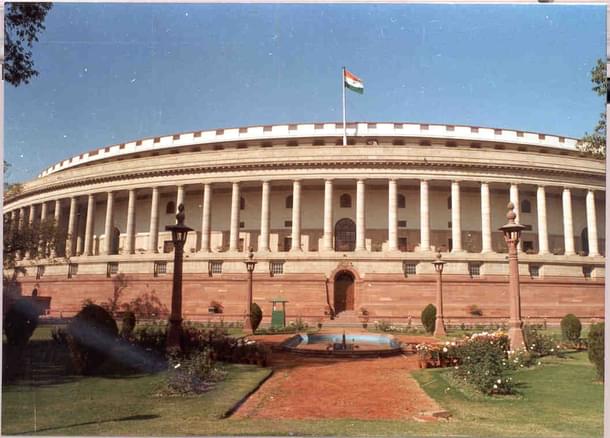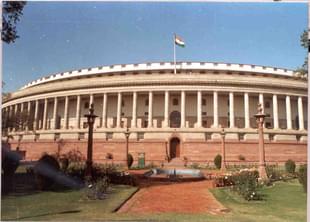Politics
Explained: Why Bankruptcy Code Is A 'Money Bill', And Why Congress Can’t Kill It
Swarajya Staff
Dec 22, 2015, 11:16 PM | Updated Feb 12, 2016, 05:33 PM IST
Save & read from anywhere!
Bookmark stories for easy access on any device or the Swarajya app.


The Modi government’s decision to push the Bankruptcy Code as a ‘money’ bill makes sure that the Congress can’t stall it. Here’s why:
To become law, legislation has to be passed by both houses of parliament. In the absence of a majority in the Rajya Sabha, the BJP-led NDA can thus be endlessly blocked in the Upper House, till the composition of the house changes in 2017. Even then it will take some effort.
This is why the Bankruptcy Code, 2015, has been introduced as a ‘money’ bill, where the Lok Sabha has primacy.
Article 110 of the constitution of India defines a ‘money bill’ as one that deals with any or all of the following cases.
“(a) The imposition, abolition, remission, alteration or regulation of any tax; (b) the regulation of the borrowing of money or the giving of any guarantee by the government of India, or the amendment of the law with respect to any financial obligations undertaken or to be undertaken by the government of India; (c) the custody of the consolidated fund or the Contingency Fund of India, the payment of moneys into or the withdrawal of moneys from any such Fund; (d) the appropriation of moneys out of the Consolidated Fund of India; (e) the declaring of any expenditure to be expenditure charged on the Consolidated Fund of India or the increasing of the amount of any such expenditure; (f) the receipt of money on account of the Consolidated Fund of India or the public account of India or the custody or issue of such money or the audit of the accounts of the Union or of a State; or (g) any matter incidental to any of the matters specified in sub clauses (a) to (f).”
The Bankruptcy Code not only proposes amendments to the Income Tax Act, 1961, but also mandates the creation of an Insolvency and Bankruptcy Fund which will obviously be funded by the Consolidated Fund of India. Hence money bill.
Moreover, a bill can be declared a money bill by the Speaker, and her decision is final. This is clear from further provisions of article 110.
Clause (3) makes it amply clear that “if any question arises whether a Bill is a Money Bill or not, the decision of the Speaker of the House of the People thereon shall be final.”
Moreover, clause (4) makes the point that “every money bill, when it is transmitted to the Council of States under article 109, and when it is presented to the President for assent under article 111,” shall be endorsed by a “certificate of the Speaker of the House of the People signed by him (or her) that it is a money bill.”
The provisions that make it clear that the Rajya Sabha cannot stall a money bill are contained in article 109, which makes it abundantly clear that the Lok Sabha’s word is final on money bills. It says:
(1) A money bill shall not be introduced in the Council of States (Rajya Sabha). (2) After a money bill has been passed by the House of the People it shall be transmitted to the Council of States for its recommendations and the Council of States shall within a period of 14 days from the date of its receipt of the Bill return the Bill to the house of the People with its recommendations and the House of the People may thereupon either accept or reject all or any of the recommendations of the Council of States. (3) If the House of the People accepts any of the recommendations of the Council of States, the money bill shall be deemed to have been passed by both Houses with the amendments recommended by the Council of States and accepted by the House of the People. (4) If the House of the People does not accept any of the recommendations of the Council of States, the money bill shall be deemed to have been passed by both Houses in the form in which it was passed by the House of the People without any of the amendments recommended by the Council of States. (5) If a money bill passed by the House of the People and transmitted to the Council of States for its recommendations is not returned to the House of the People within the said period of fourteen days, it shall be deemed to have been passed by both Houses at the expiration of the said period in the form in which it was passed by the House of the People.”





